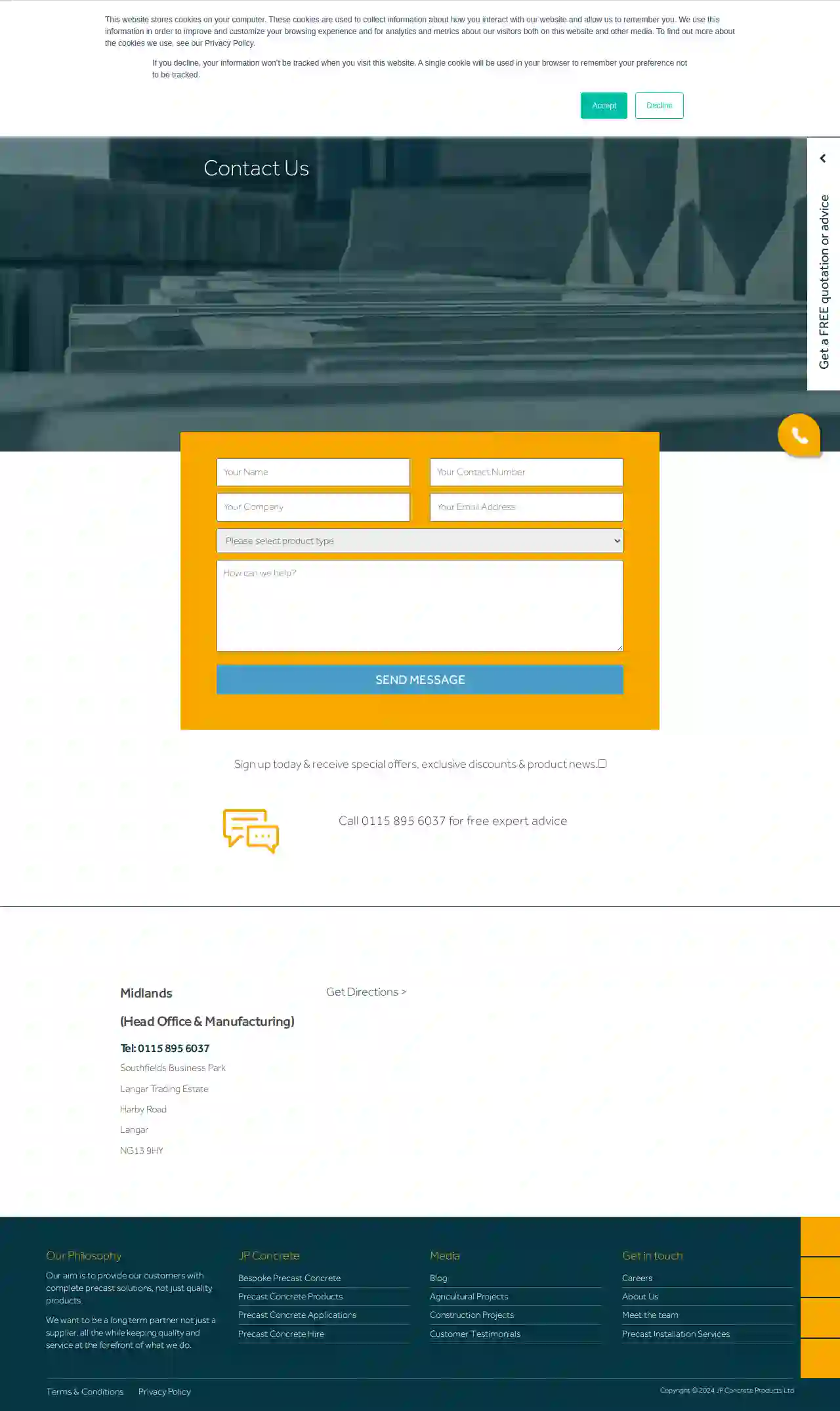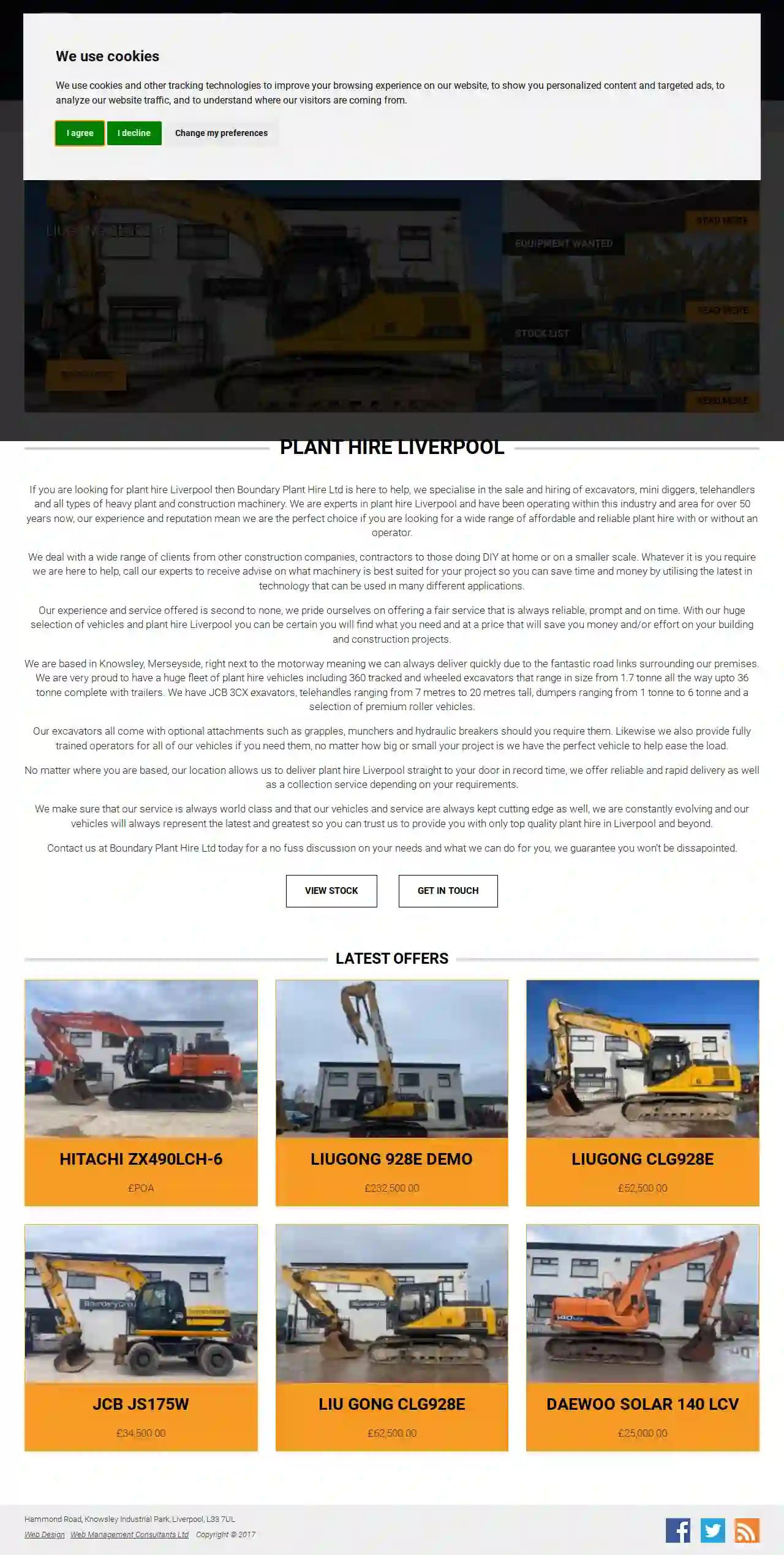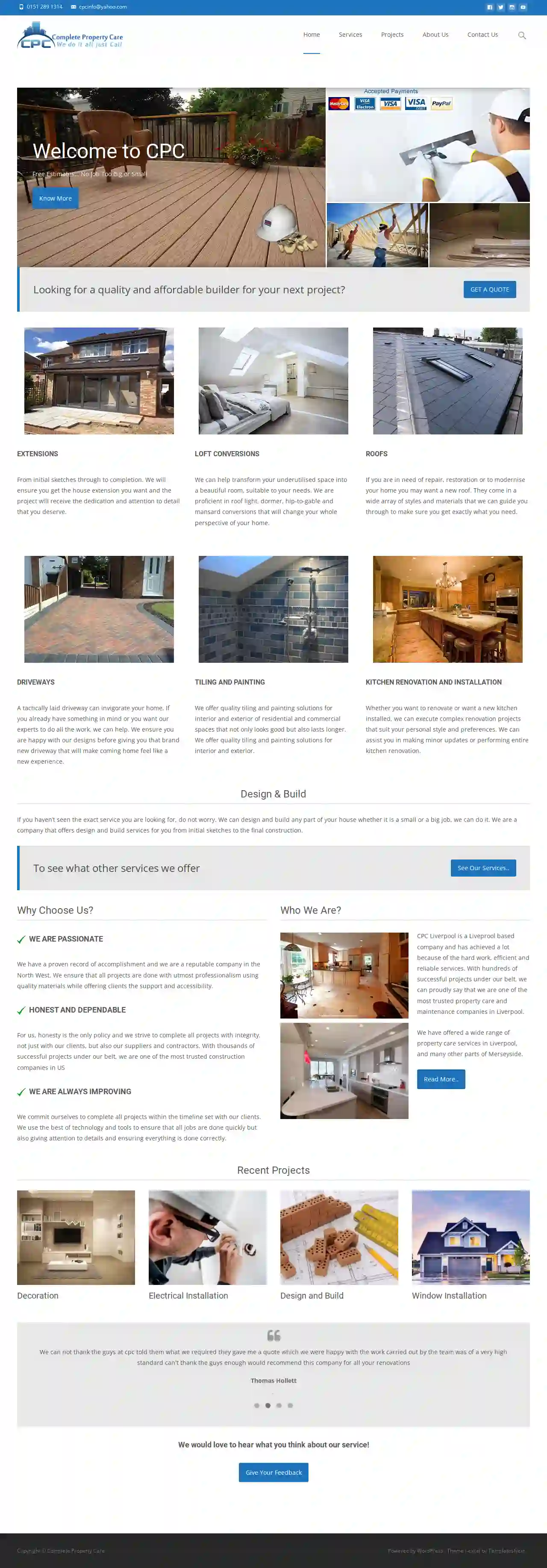Demolition Contractors West Derby
Top 10 Demolition Experts in West Derby
Receive 3 FREE Demolition Companies quotes for your project today! Compare profiles, reviews, accreditations, portfolio, etc... and choose the best deal.

JP Concrete
Bedford Road, Industrial Estate, Unit 1, Bedford Road Industrial Estate, Bedford, MK44 1RE, GBAbout JP Concrete JP Concrete is a leading supplier of precast concrete products and services to the construction and agricultural industries. We have a wealth of experience in the design, manufacture, and installation of a wide range of precast concrete products, including retaining walls, concrete barriers, ground beams, and more. Our Mission Our mission is to provide our customers with high-quality precast concrete products and services that meet their specific needs. We are committed to delivering exceptional customer service and exceeding expectations. Our Values We are committed to the following values: Quality Innovation Customer Focus Sustainability Teamwork Our Experience JP Concrete has been in business for over 20 years and has a proven track record of delivering high-quality precast concrete products and services. We have a team of experienced professionals who are dedicated to providing our customers with the best possible service.
- Services
- Why Us?
- Testimonials
- Gallery
Get Quote
Boundary Plant Hire Ltd
Hammond Road, Knowsley Industrial Park, Liverpool, L33 7UL, GBPlant Hire Liverpool If you're looking for plant hire in Liverpool, Boundary Plant Hire Ltd is here to help. We specialize in the sale and hiring of excavators, mini diggers, telehandlers, and all types of heavy plant and construction machinery. We're experts in plant hire in Liverpool and have been operating in this industry and area for over 50 years. Our experience and reputation make us the perfect choice if you're looking for a wide range of affordable and reliable plant hire, with or without an operator. We work with a wide range of clients, from other construction companies and contractors to those doing DIY at home or on a smaller scale. Whatever you need, we're here to help. Call our experts to get advice on what machinery is best suited for your project so you can save time and money by utilizing the latest technology that can be used in many different applications. Our experience and service are second to none. We pride ourselves on offering a fair service that is always reliable, prompt, and on time. With our huge selection of vehicles and plant hire in Liverpool, you can be certain you'll find what you need at a price that will save you money and/or effort on your building and construction projects. We're based in Knowsley, Merseyside, right next to the motorway, meaning we can always deliver quickly due to the fantastic road links surrounding our premises. We're very proud to have a huge fleet of plant hire vehicles, including 360 tracked and wheeled excavators that range in size from 1.7 tonnes all the way up to 36 tonnes, complete with trailers. We have JCB 3CX excavators, telehandlers ranging from 7 meters to 20 meters tall, dumpers ranging from 1 tonne to 6 tonnes, and a selection of premium roller vehicles. Our excavators all come with optional attachments such as grapples, munchers, and hydraulic breakers should you require them. Likewise, we also provide fully trained operators for all of our vehicles if you need them. No matter how big or small your project is, we have the perfect vehicle to help ease the load. No matter where you're based, our location allows us to deliver plant hire in Liverpool straight to your door in record time. We offer reliable and rapid delivery as well as a collection service depending on your requirements. We make sure that our service is always world-class and that our vehicles and service are always kept cutting edge. We're constantly evolving, and our vehicles will always represent the latest and greatest, so you can trust us to provide you with only top-quality plant hire in Liverpool and beyond. Contact us at Boundary Plant Hire Ltd today for a no-fuss discussion on your needs and what we can do for you. We guarantee you won't be disappointed.
- Services
- Why Us?
- Gallery
Get Quote
PRNS Building Services Ltd
4.84 reviewsUnit 15-16 Mill Lane Trade Park, Wylam Rd, Liverpool, L13 4BF, GBConstruction specialist within the lift & escalator industry. Established in 2009, PRNS Building Services are nationally operating specialists within the Lift and Escalator Industry. Construction companies are abundant across the country; here at PRNS we are devoted to ensuring that we can provide a specialist service that sits head and shoulders above our competitors. Why Choose PRNS Building Services Along with this, we pride ourselves on our customer service, holding you, the client at the top of our list; supporting you in finding the most efficient and effective solutions to conclude your projects. PRNS Building Services have worked within the Lift Industry for the past 13 years, where our teams have worked on projects nationwide with over 50 different lift companies – a number that continues to expand as we grow. Our concentration on outstanding customer service, along with effective and efficient solutions ensure the smooth running of projects for you and your clients. Whether it’s a modernisation project, lift refurbishment or a flooded pit – we’ve got the solution. Escalators At PRNS, we also have a strong track record within the Escalator Industry. Our teams have worked nationwide on projects, including sites in Liverpool, Manchester, London, and Dundee. Not only do we regularly support projects with construction solutions, such as our bespoke temporary hoardings, lift shaft construction and removing entrances; we also provide support for electrical elements of your projects – providing maintenance and support with testing when needed.
- Services
- Why Us?
- Gallery
Get Quote
Ole Veteran Fisheries & Excavation
44 reviews2088 Shore Rd, Liverpool, B0T 1K0, GBLEADING EXCAVATION, LANDSCAPING AND LOT PREPARATION FOR CONSTRUCTION We provide reliable services to commercial and residential properties using the latest equipment and trusted techniques. Our expertise lies in our years of experience. Experienced Excavating Contractor in Liverpool, NS Few things can compare to the moment you have found just the right plot for your new home or commercial address. But before you can start building, a few things need to be done well to prepare the land. At Ole Veteran Fisheries Ltd, we provide everything you need to get your lot prepared, and once your home is built, we have everything you need to make the exterior picture perfect. Our excavating contractors in Liverpool have years of experience. If you're looking for an excavating contractor in Liverpool, we invite you to schedule an appointment. We will provide bespoke services per your requirements, property type and budget.
- Services
- Why Us?
- Gallery
Get Quote
Complete Property Care Liverpool Ltd.
52 reviewsLiverpool, GBAbout CPC Liverpool CPC Liverpool is a Liverpool-based company that has achieved a lot because of its hard work, efficient and reliable services. With hundreds of successful projects under our belt, we can proudly say that we are one of the most trusted property care and maintenance companies in Liverpool. We have offered a wide range of property care services in Liverpool, and many other parts of Merseyside. We strive to maintain the highest standards while exceeding client’s expectations at all levels. We not only honour commitments, but are known for meeting tough deadlines while delivering nothing but the best. We aim to create a responsive client relationship that allows us to meet and even exceed the goals of each of our projects. CPC Liverpool is well known for its innovation and by collaborating successfully with our customers, designers, sub-contractors, consultants as well as suppliers; we have been able to provide more specialized level of services. We are continuously evolving and understand the different aspects of delivering high value construction and complex projects with ease. We are extremely proud of the reputation that we have earned over the past few years for a whole variety of projects which is why the majority of our work tends to come from personal recommendation. All our work is carried out to the highest standards. Please feel free to contact us using the details on the contact page if you have any questions or comments about the kinds of work we undertake.
- Services
- Why Us?
- Gallery
Get Quote
Drain Unblocking, Surveying and Repairs - Mersey Rod
4.9290 reviewsLiverpool, GBMersey Rod: Your Trusted Drainage Experts Mersey Rod is a leading drainage company serving Merseyside, Lancashire, Greater Manchester, Cheshire, and North Wales. We offer a comprehensive range of services, from drain clearance and unblocking to CCTV surveys and drain repairs. Our team of experienced and qualified engineers is dedicated to providing our clients with the highest quality service at competitive prices. Our Commitment to Excellence At Mersey Rod, we are committed to providing our clients with the best possible service. We use the latest technology and equipment to ensure that all our work is carried out to the highest standards. We are also fully accredited and insured, giving you peace of mind that your project is in safe hands. Why Choose Mersey Rod? Experienced and qualified engineers 24/7 emergency service Competitive prices Fully accredited and insured Commitment to customer satisfaction
- Services
- Why Us?
- Accreditations
- Gallery
Get Quote
Liverpool Fencing
4.9134 reviewsLiverpool, GBWelcome to Liverpool Fencing No 1 For All Garden Fencing Liverpool, Paving, Decking, & Garden Makeovers Based in Merseyside. With over 20 years experience, Liverpool Fencing are based in Liverpool, Merseyside, and cover all local areas from Southport to Runcorn and Skelmersdale to the Wirral and all surrounding areas. Liverpool Fencing provide a number of quality services to both commercial and domestic clients including Fencing, Paving, Decking, Wood Gates and Garden Makeovers. Whether you are looking for a small repair job or a commercial surfacing project, Liverpool Fencing will offer the complete personalised service that will meet your own specific needs and at the right price. Offering the finest fencing, drive, patio and pathway products, we are dedicated to making your dreams a reality. With a vast choice of colours and styles to choose from your design possibilities are virtually limitless. Only the best quality products are used and we are happy to recommend materials to suit your property or budget. Liverpool Fencing also offer driveway restoration if your driveway or patio needs a bit of TLC. this includes an industrial power wash, Re-sanding and sealing can also be undertaken if required. For all your garden dreams and needs, Liverpool Fencing can revive your property from new patios, steps or walls to fencing and much more. We use staff with years of experience and are happy to provide a full design service or to work to your specifications. Services include – Garden fencing, timber fencing, wood fencing, decking, driveways and landscaping. We guarantee all our work and only use quality materials.
- Services
- Why Us?
- Testimonials
- Gallery
Get Quote
Abel Landscapes
4.433 reviewsAbel Landscaping, Orrell Park, 6 Albert Drive, Liverpool, L9 8BQ, GBAbout Abel Landscaping At Abel Landscaping, we're passionate about transforming your outdoor dreams into reality. Whether you're envisioning a lush garden, a beautiful driveway, or a stunning patio, our expert team is here to help. We're dedicated to providing exceptional landscaping and driveway services in Liverpool, catering to both residential and commercial clients. We pride ourselves on our craftsmanship, creativity, and commitment to customer satisfaction. Our experienced team uses top-quality materials and innovative designs to transform ordinary spaces into extraordinary outdoor retreats. Ready to enhance your outdoor space? Contact us today to discuss your landscaping and driveway needs. Whether you have specific ideas in mind or need guidance from our experts, we're here to help you every step of the way.
- Services
- Why Us?
- Testimonials
- Gallery
Get Quote
A & B Services Liverpool Limited
52 reviewsLiverpool, GBWelcome to A&B Services (Liverpool) LTD – A family run business established since 1990. We are based in Merseyside. We provide a proactive and creative attitude to all works undertaken; A company that places its values on Customer Service, Workmanship, Reliability and Quality. Working with some of the key names in the industry, maintaining and keeping businesses trading throughout the North West; steadily building our business on the back of a good reputation and recommendation from satisfied clients. This coupled with our extensive industry knowledge makes A&B Services the ideal company for all your Refurbishment ,Planned Maintenance & Reactive Maintenance for, schools, venues or retail. A&B Services (Liverpool) LTD work with some of the leading companies in the industry, supplying its skills and experience throughout the North west region.
- Services
- Why Us?
- Gallery
Get Quote
SLJ Civils Ltd
Liverpool, GBWelcome to SLJ Civils At SLJ Civils we offer quality groundworks with the dedication and workmanship that has earned us a solid reputation as expert groundworks contractors in and around Liverpool, Merseyside, Southport, Warrington, Widnes, Cheshire, and surrounding areas. What’s more, with over 25 years of experience in the industry, we offer professional, and reliable contracting services for a variety of groundworks including: Paving Tarmacing Driveways Resurfacing and reinstatement Resin Driveways Landscaping All our contractors take pride in our outstanding workmanship, coupled with the ability to deliver outstanding results. For quality laid groundworks in Liverpool, Merseyside, Southport, Warrington, Widnes, Cheshire and surrounding areas. Since we were founded in 2017, we have worked hard at building and maintaining our reputation as a leading groundworks and paving contractor. Where our friendly and professional contractors are used to working with businesses, and domestic customers alike. For a truly professional, outstanding groundworks service that is second to none. So, if you are looking for a local contractor for anything from a new resin driveway to traffic calming measures on a public road, you can rely on SLJ Civils. Your first choice for expert groundwork contractors in Liverpool, Merseyside, Southport, Warrington, Widnes, Cheshire, and surrounding areas. Additionally, we are Streetworks certified and fully insured, for your complete peace of mind. So, what are you waiting for? Contact SLJ Civils today to discuss your requirements for groundworks, paving, tarmacing, resurfacing and reinstatement, grab hire, Resin Driveways, and more in Liverpool, Merseyside, Southport, Warrington, Widnes, Cheshire, and surrounding areas.
- Services
- Why Us?
- Gallery
Get Quote
Over 13,059+ Excavation Companies on our platform
Our excavation contractors operate in West Derby and beyond!
ExcavationHQ has curated and vetted Top Excavation Contractors arround West Derby. Find a top & reliable business today.
Frequently Asked Questions About Demolition Contractors
- Size and Complexity of the Structure: Larger and more complex structures, such as multi-story buildings, require more time, labor, and specialized equipment, increasing costs.
- Type of Demolition: Different demolition methods, such as implosion, wrecking ball, or high-reach demolition, have varying costs.
- Material Disposal: Disposal fees for demolition debris can contribute significantly to the overall cost, depending on the type and quantity of materials.
- Location and Accessibility: Demolition in densely populated areas or with limited access may require more planning and specialized equipment, affecting costs.
- Hazardous Materials: The presence of asbestos, lead paint, or other hazardous materials requires specialized removal and disposal procedures, adding to the expenses.
- Recycling: Concrete, brick, metal, and wood can be recycled and reused in other construction projects, reducing waste sent to landfills.
- Landfill Disposal: Non-recyclable materials are disposed of in designated landfills according to local regulations.
- Donation: Some materials, such as fixtures or appliances, may be suitable for donation to charitable organizations.
How much does demolition cost in the UK?
What is the difference between demolition and deconstruction?
Demolition: Typically involves bringing down a structure quickly and efficiently, often using heavy machinery and potentially explosives. The primary goal is to clear the site.
Deconstruction: Focuses on carefully dismantling a building piece by piece to salvage reusable materials. It prioritizes minimizing waste and environmental impact, often involving manual labor and specialized tools.
The choice between demolition and deconstruction depends on the project's objectives, budget, and environmental considerations.
What happens to the debris after demolition?
How long does a demolition project take?
How much does demolition cost in the UK?
- Size and Complexity of the Structure: Larger and more complex structures, such as multi-story buildings, require more time, labor, and specialized equipment, increasing costs.
- Type of Demolition: Different demolition methods, such as implosion, wrecking ball, or high-reach demolition, have varying costs.
- Material Disposal: Disposal fees for demolition debris can contribute significantly to the overall cost, depending on the type and quantity of materials.
- Location and Accessibility: Demolition in densely populated areas or with limited access may require more planning and specialized equipment, affecting costs.
- Hazardous Materials: The presence of asbestos, lead paint, or other hazardous materials requires specialized removal and disposal procedures, adding to the expenses.
What is the difference between demolition and deconstruction?
Demolition: Typically involves bringing down a structure quickly and efficiently, often using heavy machinery and potentially explosives. The primary goal is to clear the site.
Deconstruction: Focuses on carefully dismantling a building piece by piece to salvage reusable materials. It prioritizes minimizing waste and environmental impact, often involving manual labor and specialized tools.
The choice between demolition and deconstruction depends on the project's objectives, budget, and environmental considerations.
What happens to the debris after demolition?
- Recycling: Concrete, brick, metal, and wood can be recycled and reused in other construction projects, reducing waste sent to landfills.
- Landfill Disposal: Non-recyclable materials are disposed of in designated landfills according to local regulations.
- Donation: Some materials, such as fixtures or appliances, may be suitable for donation to charitable organizations.